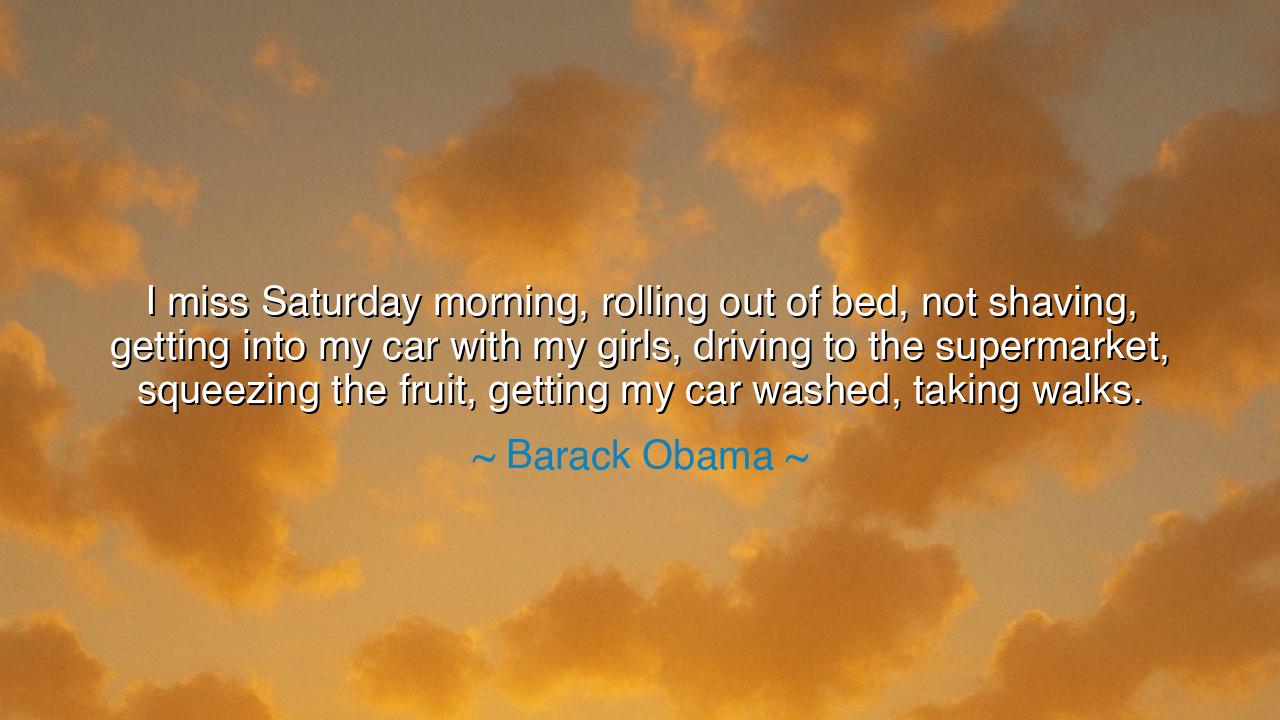
I miss Saturday morning, rolling out of bed, not shaving
I miss Saturday morning, rolling out of bed, not shaving, getting into my car with my girls, driving to the supermarket, squeezing the fruit, getting my car washed, taking walks.






Hear now the words of Barack Obama, who bore upon his shoulders the burdens of a nation, yet confessed with quiet longing: “I miss Saturday morning, rolling out of bed, not shaving, getting into my car with my girls, driving to the supermarket, squeezing the fruit, getting my car washed, taking walks.” In this simple remembrance lies a truth as deep as any law of state: that the treasures of life are not always in great victories or in lofty thrones, but in the ordinary rhythms of love and family.
The meaning of these words rests in the longing for simplicity. Obama, who stood as the most powerful man in the world, surrounded by ceremony, security, and the gaze of millions, looked back with yearning to the humble pleasures of freedom: the unshaven morning, the drive without escort, the shared laughter of his daughters while strolling aisles of fruit. He reminds us that greatness often costs the ordinary, that power and duty can strip away the small joys we so easily overlook.
This is no new truth. Consider the life of Marcus Aurelius, emperor of Rome, philosopher upon the throne. In his Meditations, he often lamented the trappings of rule and found solace only in the contemplation of simple, natural things: the warmth of bread, the dance of olive oil poured from the jar, the scent of earth after rain. Though he commanded legions, he too longed for the humble beauty of life unadorned. Obama’s yearning echoes the same eternal song: the crown is heavy, but the touch of ordinary life is light.
The origin of Obama’s reflection lies in his years in the White House, where even the smallest errand required convoys, security, and the weight of scrutiny. No longer could he, as a father, wander freely with his daughters; no longer could he move among the people as a man unnoticed. Thus the things most ordinary to us—grocery shopping, washing a car, walking freely down a street—became treasures remembered, tokens of a life exchanged for duty. In naming them, he teaches us to cherish what we still possess, before we too learn to miss it.
The lesson here is one of gratitude. We often chase the extraordinary, believing that joy lies only in wealth, in fame, in power. Yet those who reach such pinnacles often gaze back at the ordinary with longing. The sweetness of life is found in unguarded laughter, in the weight of fruit in the hand, in the casual walk beneath the sun. To miss such things is to realize too late that they were the true jewels all along. Let us not wait for loss to awaken appreciation.
Think also of George Washington, who, after leading a revolution and shaping a nation, longed above all for the quiet of Mount Vernon, where he might walk among his fields and greet the dawn with no trumpets. The pattern repeats itself through history: leaders, conquerors, and heroes who, in the end, discover that what they desire most is not glory, but simplicity, family, and the peace of common life.
Therefore, O children of tomorrow, let this truth guide you: do not despise the ordinary. Do not rush past the morning walk, the shared meal, the laughter of your children, the touch of fruit in the market. These are the treasures kings have envied and presidents have missed. If you honor them now, you will live richly, even without wealth or fame. If you ignore them, you may one day look back, longing, as Obama did.
So let his words endure as a gentle commandment: cherish simplicity. The unshaven morning, the walk with loved ones, the errands of a Saturday—these are the true crown of life. Seek not only greatness in the eyes of the world, but greatness in the ordinary, for there lies the joy that endures beyond titles and power.






AAdministratorAdministrator
Welcome, honored guests. Please leave a comment, we will respond soon